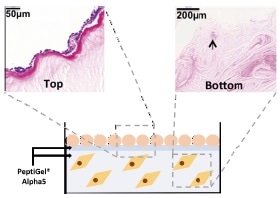The challenge
Barrett's esophagus is a condition in which the cells in the esophagus grow abnormally and if it is not treated, it frequently leads to cancer. Esophageal cancer is the 8th most common cancer in the world.
It is possible to manage the disease by eliminating the pre-cancerous cells endoscopically. However, this treatment can also cause healthy cells to become damaged and lead to fibrotic strictures, narrowing the esophagus and resulting in additional challenges for patients.
At the moment, these strictures are managed using endoscopic balloon dilation; however, common side effects include bleeding, perforation and septicemia.
One method to treat this condition is to apply a hydrogel after surgery to encourage healthy regeneration of the esophagus. At present, most hydrogels are drawn from animal sources and as a result are not appropriate for clinical translation. However, PeptiGels® provides a clinically translatable solution.
The science
Researchers at The Universities of Manchester and Nottingham, led by Professor Julie Gough, have investigated PeptiGels® for use in the treatment of these strictures.
These hydrogels have been developed especially to promote cell growth, are completely synthetic and inherently immunogenic and biodegradable, opening up the opportunity for clinic use.
They also contain shear-thinning properties, so they can be sprayed endoscopically directly to the treatment area and their mucoadhesive properties mean they stay at the administration site, ensuring they are the perfect candidates for tissue regenerative scaffolds.
Using Manchester BIOGEL's PeptiGels®, we were able to grow 3D co-cultures of primary esophageal cells with the desired morphology and functionality. These findings are the first step in using these synthetic hydrogels to manage structures caused by endoscopic treatment of Barretts' esophagus.
Julie Gough, Professor of Biomaterials and Tissue Engineering, The University of Manchester
The results
Through the exploration of a library of PeptiGels® (Starter Pack) the optimal hydrogel for the culture of each esophageal cell was discovered; rat esophageal stromal fibroblasts (rOSFs) within the hydrogel (3D) and mouse esophageal epithelial cells (mOECs) on the surface (2D).
Somewhat predictably, the cells responded best to the PeptiGel® with the mechanical properties most alike to native human esophageal tissue, Alpha5; the rOSFs were fibroblastic in appearance and desired mOEC morphology and epithelial sheet formation was detected.

Image Credit: Manchester BIOGEL
Work then progressed to examine a three-dimensional (3D) co-culture system, more representative of in vivo esophageal tissue, utilizing this PeptiGeI®. After a week, this multicellular and multiplayer matrix had successfully supported the creation of a functional, uninterrupted epithelial sheet.
The future
This promising data is now being taken to the next level in order to make further advances towards a new treatment for stricture management in Barrett's esophagus.
About Manchester BIOGEL
Over 15 years ago, Professors Aline Miller and Alberto Saiani at The University of Manchester synthesised a self-assembling oligo-peptide with interesting gelation properties. This work started with a small grant from the University.
Over subsequent years, the team meticulously crafted and studied self-assembling peptides to perfect their platform technology and produce a range of hydrogels ideal for 3D cell culture. In 2014, due to a demand for their materials, our company, Manchester BIOGEL was founded to enable these hydrogels to be readily available to researchers wishing to create new opportunities in the high-growth fields of 3D cell culture, 3D bioprinting and medical devices. Since opening our doors, we have supported scientists in the UK and beyond to create optimal environments for a wide variety of cell types.
Sponsored Content Policy: News-Medical.net publishes articles and related content that may be derived from sources where we have existing commercial relationships, provided such content adds value to the core editorial ethos of News-Medical.Net which is to educate and inform site visitors interested in medical research, science, medical devices and treatments.